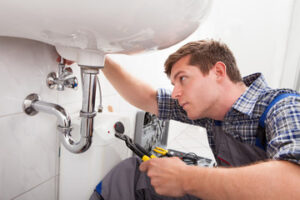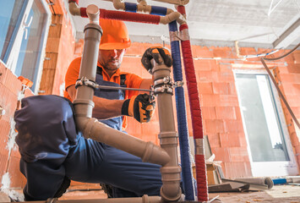Whether they’re fixing leaky pipes or installing water heaters, plumbers provide essential services that keep homes and businesses running smoothly. This makes plumbing one of the most recession-proof careers.

Leaky faucets and clogged drains don’t wait for good economic times, so the need for Pearland Plumber is constant. Learn what the job entails and how to get started in this skilled trade.
Plumbing involves installing and repairing pipes that carry water, gas, and waste throughout a building. The work can be extremely complex and dangerous, so it’s important to hire a licensed plumber with the right skills and experience. Whether you need repairs for an existing system or are planning to build a new home, a plumber can help. Here are some of the tasks they perform:
During the construction phase, a plumber creates an overall plumbing design for the structure. This includes locating and marking where pipes will be installed, ensuring that the layout meets code requirements and is safe for occupants. They also connect water supply lines to fixtures like faucets, toilets, and showerheads. Fixtures can be decorative as well as functional, so the plumber may consult with a designer or the homeowner to select appropriate styles and finishes.
Once the piping is installed, a plumber can test the water pressure and make any necessary adjustments. They can also install appliances like dishwashers and washing machines. Finally, a plumber will ensure that all fixtures are watertight and drain and vent systems are working properly. Before a plumbing contractor leaves the job site, they should give the owner a copy of the final inspection report and discuss any next steps.
A plumber can also handle residential plumbing, which is more common than commercial. This type of plumbing usually involves fixing clogged drains, installing fixtures, and making sure that water is safe for drinking. A residential plumber can use the same tools and techniques as a commercial plumber, but they will likely charge lower rates.
When hiring a plumber, it’s important to find one who is licensed and insured. This will protect you in case the plumber makes a mistake that leads to property damage or injury. It’s also a good idea to ask for references and check online reviews before hiring anyone.
While you can do some plumbing tasks yourself, it’s always best to leave the complex work to a professional. Not only will this save you time and money, it will also ensure that the work is done correctly and up to code. A plumber with the right training and experience can diagnose and fix problems quickly and efficiently.
Plumbing Repair
Plumbing repair involves working on existing pipes and fixtures to fix issues like leaks, clogs, or wear-and-tear. Plumbers can also perform routine maintenance on plumbing systems to extend their lifespan and prevent problems from occurring in the first place. This includes tasks like adjusting water pressure and temperature, cleaning drains, and more.
Some plumbing repairs can be done by homeowners themselves, such as replacing a toilet flapper or unclogging a drain. However, it’s always best to consult a professional for any major or complex plumbing issues. This helps ensure the safety and integrity of your home’s plumbing system, and can help you save money by avoiding unnecessary repairs.
Common plumbing repair issues include dripping faucets, clogged drains, and water heater problems. These can be easily fixed with the right tools and knowledge. For example, a dripping faucet can be easily fixed by replacing the washer or O-ring. However, if you have a more serious issue such as a broken pipe or sewage backing up into your home, it’s important to call a plumber immediately.
Plumbing companies can offer a variety of repair services, including pipe repairing and replacement, sewer line repair, drain cleaning, and more. Some plumbers even offer trenchless technology, which uses modern tools and methods to repair underground pipes without invasive digging or surface disruption.
A good plumber can handle any type of repair, from minor to major. They can also advise you on the best way to maintain your plumbing system, to reduce repair costs and avoid future problems. For instance, you can prevent clogs by using low-flow showerheads and faucets, installing drain traps, and avoiding flushing non-biodegradable items down the drain.
When choosing a plumber, make sure they are licensed and insured. This ensures that the work will be performed correctly and safely, and that you’re covered in case of any accidents or mistakes. Also, look for a plumber who offers a warranty on their services, which will give you peace of mind that the work will be done right. Having a basic understanding of plumbing terms and concepts can also help you communicate with plumbers better and avoid getting overcharged for services.
Plumbing Maintenance
Plumbing maintenance is the work that a plumber performs to keep a building’s plumbing systems functioning properly. It involves a wide variety of tasks, from inspecting pipes for leaks and corrosion to cleaning drains and water heaters. Regular inspections can help a plumber identify potential issues before they become costly problems, such as water damage and mold growth. A plumber can also advise property owners on how to best maintain their plumbing systems, such as by using low-flow fixtures and insulating pipes in cold weather.
Plumbing issues can be caused by many different factors, including age, environmental conditions, and improper installation. For example, older pipes are more likely to leak or burst due to corrosion and wear. Incorporating newer, more durable pipes can help reduce this risk. A plumber can also assess the condition of a plumbing system and recommend any upgrades or replacements.
Leaks are a common plumbing issue that can lead to expensive repair bills and water waste. A plumber can seal leaks and other damages to prevent further water loss. Plumbers can also install water pressure regulators to balance out high water pressure and prevent excessive stress on pipes and fixtures.
Clogged drains are another major plumbing problem that can cause significant damage to a home or business. A plumber can clean clogged drains and install mesh drain covers to prevent future blockages. They can also advise property owners on how to avoid clogs, such as by using drain stoppers and taking care not to flush items down the toilet that are too large or shouldn’t be there.
Performing routine plumbing maintenance can help keep a plumbing system running efficiently and reduce energy bills. For example, a plumber can install or replace worn out faucet washers to prevent water leaks and reduce the amount of hot water used in a home. They can also suggest ways to conserve water, such as by installing water-saving shower heads and replacing old toilets with low-flow models.
When choosing a plumber for routine maintenance, property owners should look for a professional who is licensed and insured. They should also ask about their rates and what services they include in their maintenance plans. For example, some plumbers may only perform basic maintenance tasks like fixing leaky faucets or unclogging drains, while others offer more comprehensive services such as water heater installations and sewage backup repair. Property owners should also consider a plumber’s customer service record, as well as their experience and expertise in handling maintenance tasks.
Plumbing Inspection
Plumbing inspections are an important part of property maintenance and real estate transactions. They involve a visual examination of pipes, fixtures, and appliances to identify signs of leaks or other problems. In addition to examining visible components, plumbers often use specialized equipment like moisture meters and thermal imaging cameras to detect hidden water damage in walls and under floors. A plumber may also recommend routine repairs or proactive maintenance to prevent future issues.
A thorough plumbing inspection will cover all the major appliances and systems in a home or business. This includes the water heater, venting, and drainage system; all faucets, sinks, toilets, and tubs; and the main water shut-off valve. The water heater will be examined to confirm that the pilot light is lit and that the pressure relief valve is properly positioned. Toilet flappers and other parts will be inspected to ensure that they function properly. In addition, all drains and waste lines will be inspected for proper flow and to check for leaks or clogs.
Other important aspects of a plumbing inspection include checking for energy efficiency and safety. For example, a poorly functioning water heater can lead to higher energy bills and reduced comfort. A plumber will make sure that the water heater is working properly and will discuss ways to improve the home’s energy efficiency.
Another key aspect of a plumbing inspection is ensuring that the plumbing system is ready for winter weather. This includes assessing the condition of backup generators and ensuring that sump pumps are functioning correctly. In the event of a power outage or disrupted municipal water supplies, a functioning sump pump can help keep the water in the home and prevent dangerous flooding.
A plumbing inspection is a great way to make sure that all the plumbing in your home or business is in good shape. If you have noticed any of the signs of a problem, such as slow drains or water stains, contact a plumber right away to schedule an appointment. A plumbing inspection can catch many problems before they become serious, so it is well worth the investment.
